
Sunderlal Bahuguna was an Indian environmentalist and Chipko movement leader. The idea of the Chipko movement was suggested by his wife Vimla Bahuguna and him. He fought for the preservation of forests in the Himalayas, first as a member of the Chipko movement in the 1970s, and later spearheaded the anti-Tehri Dam movement from the 1980s to early 2004. He was one of the early environmentalists of India, and later he and others associated with the Chipko movement and started taking up wider environmental issues, such as being opposed to large dams.
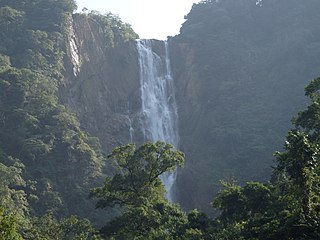
Uttara Kannada is a district in the Indian state of Karnataka. It is a major coastal district of Karnataka, and is the third largest district in Karnataka. It is bordered by the state of Goa and Belagavi districts to the north, Dharwad District and Haveri District to the east, Shivamogga District, and Udupi District to the south, and the Laccadive Sea to the west.

The Chipko movement is a forest conservation movement in India. Opposed to commercial logging and the government's policies on deforestation, protesters in the 1970s engaged in tree hugging, wrapping their arms around trees so that they could not be felled.
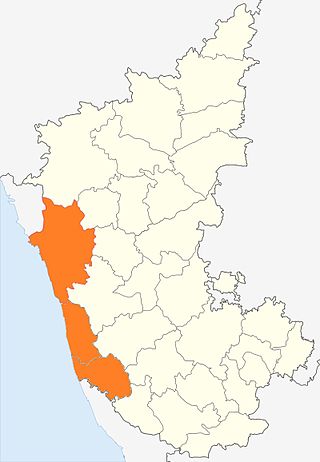
Kanara or Canara, also known as Karavali, is the historically significant stretch of land situated by the southwestern coast of India, alongside the Arabian Sea in the present-day Indian state of Karnataka. The subregion comprises three civil districts, namely: Uttara Kannada, Udupi, and Dakshina Kannada. Kassergode was included prior to the States Reorganisation Act.

Sharavati is a river which originates and flows entirely within the state of Karnataka in India. It is one of the few westward flowing rivers of India and a major part of the river basin lies in the Western Ghats. The famous Jog Falls, located about 25 km from Siddapura, is formed by this river. The river itself and the regions around it are rich in biodiversity and are home to many rare species of flora and fauna.

Kali Tiger Reserve is a protected area and tiger reserve. It is located in Uttara Kannada district, in Karnataka, India. The park is a habitat of Bengal tigers, black panthers and Indian elephants, amongst other distinctive fauna. The Kali River flows through the tiger reserve and is the lifeline of the ecosystem and hence the name. The tiger reserve is spread over an area of 1300 square kilometres.

Sirsi is a city and a taluk headquarter in Uttara Kannada district of Karnataka state in India. It was also known as Kalyana Pattana during the Sonda Dynasty. It is a tourist destination with evergreen forest and waterfalls and is also a commercial centre. The main businesses around the city are mostly subsistence and agriculture-based. Areca nut or betel nut, locally known as Adike, is the primary crop grown in the nearby villages, making it one of the major trading centres for areca nut. The region is also known for spices such as cardamom, pepper, betel leaves, and vanilla. The major food crop is paddy. This city is about 72 km away from the city of Sagara and 144 km away from Shimoga.

Anantkumar Hegde is an Indian politician, the former Union Minister of State for Skill Development and Entrepreneurship and the former five time Member of Parliament for Uttara Kannada constituency. Hegde is a member of the Bharatiya Janata Party (BJP). Hegde is a Hindu nationalist and a Rashtriya Swayamsevak Sangh (RSS) volunteer.

Bisle is a small village in the heart of south-western India's Western Ghats. The village is located in Hassan District's Sakleshpur (Sakaleshpura) Taluk.
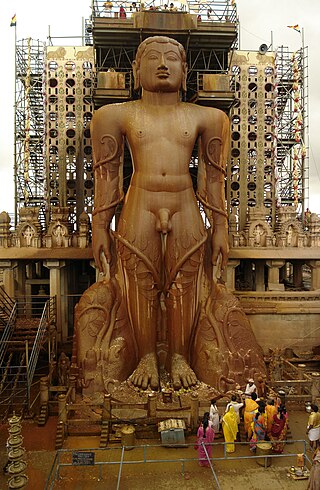
Karnataka, the sixth largest state in India, has been ranked as the third most popular state in the country for tourism in 2014. It is home to 507 of the 3600 centrally protected monuments in India, second only to Uttar Pradesh. The State Directorate of Archaeology and Museums protects an additional 752 monuments and another 25,000 monuments are yet to receive protection.

The state of Karnataka in South India has a rich diversity of flora and fauna. It has a recorded forest area of 38,720 km2 which constitutes 55 of the geographical area of the state. These forests support 25% of the elephant population and 20% of the tiger population of India. Many regions of Karnataka are still unexplored and new species of flora and fauna are still found. The mountains of the Western Ghats in the western region of Karnataka are a biodiversity hotspot. Two sub-clusters of the Western Ghats, Talacauvery and Kudremukh, are on a tentative list of sites that could be designated as World Heritage Sites by UNESCO. The Bandipur and Nagarahole national parks which fall outside these subclusters were included in the Nilgiri biosphere reserve in 1986, a UNESCO designation. In the Biligiriranga Hills the Eastern Ghats meet the Western Ghats. The state bird and state animal of Karnataka are Indian roller and the Indian elephant. The state tree and state flower are sandalwood and lotus. Karnataka is home to 524 tigers.
Sri Idagunji Mahaganapati Yakshagana Mandali, Keremane (R)(Kannada: ಇಡಗುಂಜಿ ಮಹಾಗಣಪತಿ ಯಕ್ಷಗಾನ ಮಂಡಳಿ)or simply the Keremane Yakshagana Troupe is a Yakshagana troupe based in the Uttara Kannada district of Karnataka, India. It was started by Keremane Shivarama Hegde in 1934. He is an exponent of this art form and is the first Yakshagana artist to win the Rashtrapati Award, an award handed out by the President of India to people who excel in various fields. The troupe has survived three generations, with his children Shambu Hegde, Mahabala Hegde and Gajanana Hegde and his grand son Shivananda Hegde also being exponents of Yakshagana. Keremane Shivananda Hegde is the current director of the troupe and the institution.
The Halakki-Vokkalu are an indigenous tribe of Karnataka, India. They are found predominantly in Uttara Kannada district and are distinct from Vokkaligas.

Gavali is a small village located in the Belgaum district, Karnataka state in India, southwest of the city of Belgaum. The village is surrounded by forests, waterways and falls, which are subject to illegal mining, removal of medicinal plants and deforestation.
Shri Gangadharendra Saraswati, officially Shreemajjagadguru Shankaracharya Shri Gangadharendra Saraswati Swamij, is pontiff (Guru) of Shri Sonda Swarnavalli Mutt, Sirsi, Karnataka, India. He is the 54th Guru of this mutt. He took sannyasa and ordination from Shri Jayendra Saraswathi Mahaswamiji of Kanchi Matha which is known as Kanchi kamakoti Peetham. He is a follower of Advaita Vedanta.
Sri Ananth Hegde Ashisara is an environmentalist from Uttara Kannada District, Karnataka, India and Chairman, Karnataka Biodiversity Board, Government of Karnataka.

Myristica swamps are a type of freshwater swamp forest predominantly composed of species of Myristica. These are found in three localities in India. Myristica swamps have adapted to inundation by way of stilt roots and knee roots. Myristica swamps are found in the Uttara Kannada district of Karnataka State and in the southern parts of Kerala. Recently it is found in village Bambarde, in Maharashtra's Sindhudurga district.
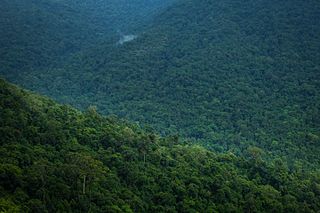
Bisle Reserve Forest is a reserve forest in westernmost Hassan district of Karnataka state, India. It is located in Hassan district's Sakleshpur taluk. Bisle village adjoins the forest to the east. It is contiguous with Kagneri Reserve Forest to the north, Bhagimalai Reserve Forest of Dakshina Kannada district to the west, and Kukke Subramanya forest range to the southwest. To the south it adjoins Pushpagiri Wildlife Sanctuary in Kodagu district. Bisle Reserve forest and the reserve forests extending north along the Bisle Ghat range form a natural corridor linking Pushpagiri Wildlife Sanctuary and Kudremukh National Park.
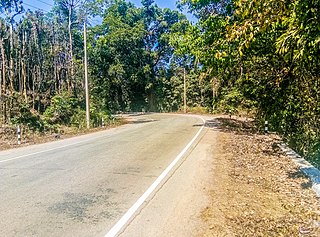
Sampkhanda or Samphakanda is a Hill station of Western Ghats located in Sirsi Taluk of Uttara Kannada District, Karnataka, India. State Highway 69 passes through this village. It is 18 km (11 mi) away from Devimane Ghat and about 16 km (9.9 mi) from its Taluk Headquarters at Sirsi. Sampakhanda is considered one of the coldest places in Karnataka during summer season.
Shantaram Budna Siddi is an Indian politician who is a nominated member of the Karnataka Legislative Council from the Bharatiya Janata Party. A member of the Siddi Tribe, he is the first Indian legislator of African descent. In the year 2021 Shantaram Budna Siddi won Sant Eshwer Sewa Samman 2021 for their Social Service and Sewa in the Field of Tribal Development and Education.














